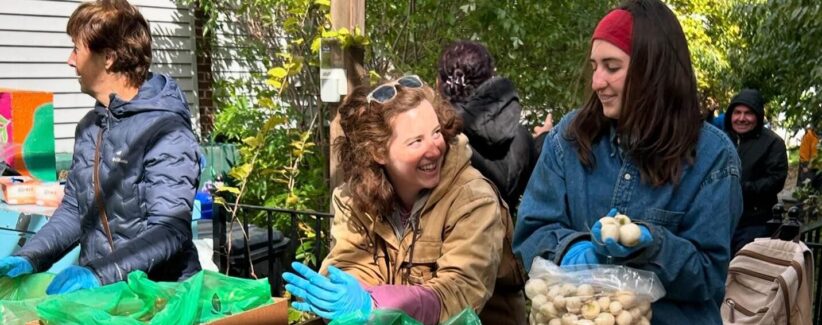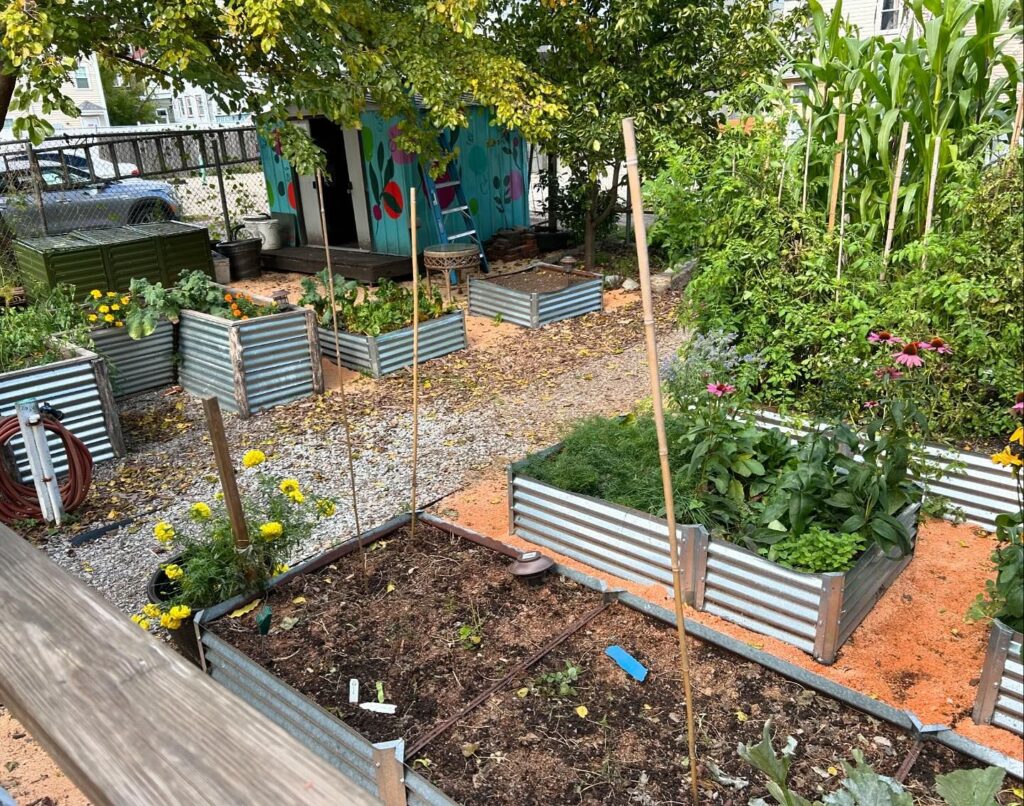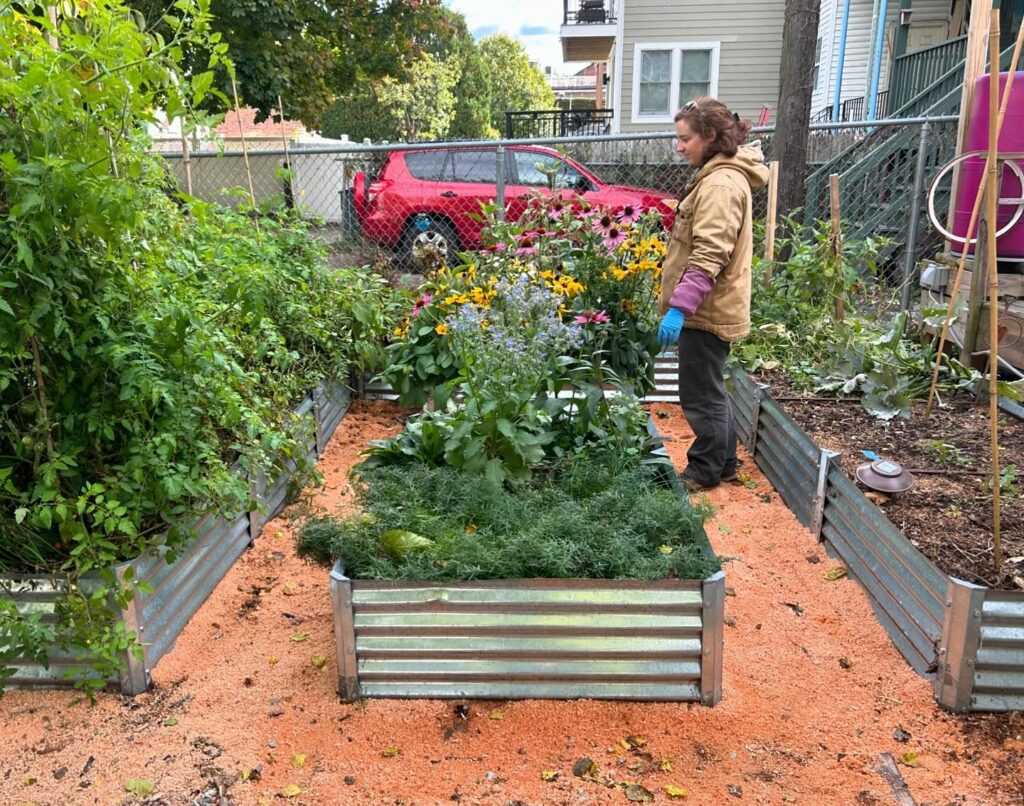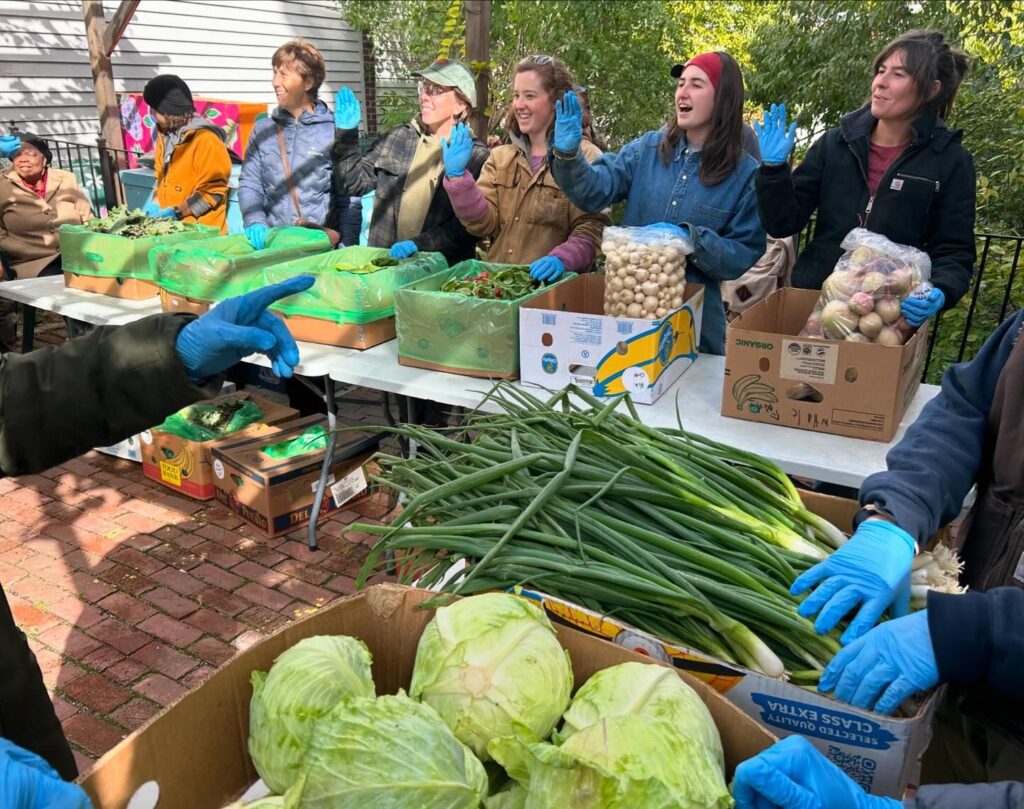An Education in Urban Agriculture and Climate Justice at Eastie Farm

Eastie Farm is an oasis. In East Boston, the organization’s farms squished between triple-decker buildings are chock-full of raised beds that grow everything from mint and other herbs to tomatoes, eggplant, and other produce, potted flowers. At its heart though, Eastie Farm is so much more than a collection of urban farms. The organization is a community hub for food distribution, and for learning about urban agriculture and climate justice. The organization distributes hundreds of pounds of Gaining Gaining Ground produce to the East Boston community each week, helping nourish families in need.
“Gentrification of East Boston has made it difficult for communities to stay here,” says Michael Zayas, the food distribution coordinator at Eastie Farm. “Those that don’t get priced out of their housing are faced with the skyrocketing cost of groceries and vegetables. People are forced to make unhealthy dietary decisions because the area has become so expensive. You can get a burger for a dollar, but you can’t get a head of broccoli for that.”

East Boston is a region facing several challenges that exacerbate food insecurity. Geographically, the region is isolated. The area is basically five separate islands connected by landfills and surrounded by water on three sides. There are really only a couple of ways into the region—bridges and tunnels —which are constantly under construction. It makes it hard for the people who live in East Boston to leave the area to get groceries. This means that most of the groceries accessible within the area are expensive.
“If someone is experiencing food insecurity, we can point them to food pantries and distribution sites in every neighborhood across Boston, and they can get rice, pasta, canned goods, but there’s almost nowhere that they can get fresh vegetables, and that’s what they need most,” says Lesego Malepe a food distribution volunteer with Eastie Farms. “Vegetables are the most valuable part of the food chain. They’re important nutrients for kids’ development, they keep adults and older folks healthy longer.”
Many of the people who call the area home are also from migrant families that are unable or afraid to access SNAP or other food subsidies or aid due to their citizenship status. The area is also the city’s most flood-vulnerable neighborhood, with hundreds of nearby residents facing regular flooding. This situation will only get worse as the climate crisis intensifies.

Kannan Thiruvengadam is part of East Boston’s immigrant community. He came to the city to study computers and used to pass the lot that would become the foundation for Eastie Farm on his way to the subway. The abandoned lot on Sumner Street was overflowing with trash and weeds and, with the help of his friends and neighbors, Thiruvengadam put together a plan to transform the abandoned land into a thriving urban garden. Since 2015, they’ve grown Eastie Farm into a community hub, improving food access, educating about urban agriculture and nature, and advocating for climate justice. Today, Eastie Farm owns two sites in East Boston and operates five others, serving clients who struggle to access the food and resources they need.
Gaining Ground’s partnership with Eastie Farm began in 2020 when the pandemic struck and caused a crisis of food insecurity that disproportionately affected under-resourced communities in Greater Boston and Eastern Massachusetts. Since the pandemic, Gaining Ground has provided weekly produce to Eastie Farm. This year, as of the end of September, we provided them more than 7,200 pounds of fresh fresh fruits and vegetables.
It’s not unusual for people to wait in line for up to two hours for food, and Eastie Farm will text people on its list when to expect food to be available. Sometimes, the language barrier makes it difficult to communicate.
“All the food is gone usually within the first half hour; we have to be strict about how much can be handed out because if we aren’t, half the line won’t get anything at all,” says Brian Frail, the volunteer coordinator at Eastie Farm.

While the produce Gaining Ground provides to Eastie Farm is distributed free for those who need it most, Eastie Farm also operates a CSA that does weekly deliveries and operates with a sliding scale price model to include low-income, SNAP benefits, regular price, and those that want to pay higher than the regular price to help subsidize the rest. Eastie’s seven plots of land are more than simply a place for community members to get food; they are hubs where locals get to connect with the land, learn about urban agriculture, and build community with their neighbors. The organization hosts weekly harvest parties throughout the growing season, helps gardeners get started with seedling scales, and conducts hands-on experiments in climate solutions. One of Eastie’s plots is home to a zero-emissions geothermal greenhouse, which they use to grow up to 7,000 pounds of food annually. Eastie often has workshops on regenerative farming methods and helps teach elementary-age students about farming through a summer program. High school students help to grow and distribute produce and learn about food justice through their Youth Climate Corps.
“Through several innovative food access initiatives Eastie Farm serves hundreds of clients—many of whom are elderly, undocumented, single-parents, differently abled, or linguistically isolated—ensuring that all needs are met,” says Allison Goodwin, operations director at Gaining Ground. “They are a true grassroots organization, deeply rooted in one of Boston’s most vibrant yet underserved neighborhoods. Gaining Ground is honored to partner with Eastie Farm to work toward achieving food security for East Boston residents.”
We are so proud and grateful to have Eastie Farm as a partner.